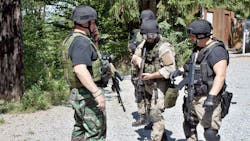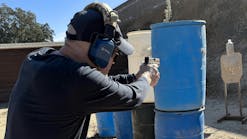Is Greed Good or Bad in Training?
So, I was a uniform wearing "modern day warrior" from late 1982 when I enlisted in the United States Army to be a Military Policeman, through this past October 2022 when I decided forty years behind a badge was enough. When I got out of the Army I went into civilian law enforcement (1985). While a police officer I re-entered military service via the Maryland Army National Guard in 1995 (Light Infantry) through 1998, and then again in 2001 (Combat Engineer) through 2003. I've been a police trainer since 1989 and just recently was motivated by various conversations and email exchanges to re-evaluate how I present myself as a trainer. That included a careful look at how I delivered training and sometimes - more importantly when displaying integrity - what I said or implied about other trainers. In this article I want to tackle one topic that will touch others: that topic is GREED. When it comes to training, you don’t want your trainers to be GREEDY.
In its most basic form, GREED can drive virtually anyone who has any appreciation for material wealth. The danger comes in when the drive for attaining wealth overwhelms one's integrity. It's usually pretty easy to spot someone who is more interested in money than in delivering a valuable product. And yes, I consider training a very valuable product - if it's from the right people and delivered in the proper fashion. Let me give you a couple of examples of what I mean from start to finish...
When you go out to seek training, usually you learn something about the people you're going to be getting the training from. The following are two resumes about the same person. One is written specifically to support training sales - in other words, it's true, but it's hyped and then some. The second one is also true, but more realistically presented.
Resume Example One:
- John Doe's early drive for success and leadership was first displayed when he graduated from an elite private high school in Washington DC in the academic top 3% of his graduating class.
- Upon graduation, driven by his deep seated patriotism, he enlisted in the United States Army Military Police Corps, completing the rigorous Military Police Academy in the top 1% performance group.
- John Doe's military service spans operations in Grenada, anti-nuclear rallies in New York City, and numerous conflict actions at virtually every duty station he was assigned.
- Upon receiving his Honorable Discharge, which documents his numerous military citations and decorations, he chose to continue serving in uniform as a law enforcement professional.
- John Doe successfully completed a specialized law enforcement academy program rated in the top three in academics, driving and on the range. Overall he had the highest aggregate average scores.
- Within three years of graduating from the academy, his inherent understanding of conflict dynamics earned him a nomination to his home state’s State Instructor Program.
- John Doe completed the State Instructor Development Program in under two weeks and was immediately assigned duties as the training officer for his metropolitan police department.
- Since 1989 when John Doe first entered the training field, he has provided instruction to Department of Defense, Federal, State, County and Local operatives in military and law enforcement missions.
- Since 1994, John Doe has been a guest instructor at the Federal Law Enforcement Training Center, the Maryland State Police Academy, and has delivered training upon request to agencies and special operations groups in dozens of states on the eastern seaboard.
- In 1995 and again in 2001, John Doe re-enlisted in the service to support our country's war on terror, each time returning to public service after receiving his Honorable Discharge.
- In 2004 and 2005, John Doe was honored as a nationally recognized Use of Force expert, and as such was invited to deliver training to a group of trainers that traveled from all over the country to attend his presentation.
- To date, John Doe has delivered thousands of hours of training in all topics of military and law enforcement operations.
- During our Nation's recovery from the attacks of nine-eleven, John Doe served as a Subject Matter Expert Consultant to the United States Army on Use of Force and Technology Development issues.
- John Doe is a widely published author, often requested to write articles on specific topics for publications that serve the military special operations profession.
Resume Example Two:
- John Doe graduated 7th out of his class of 189 at a Catholic High School in Hyattsville, MD - a suburb of Washington, DC.
- John Doe enlisted in the Army as an MP after graduation and upon completing the MP Academy - ranked #2 in his class in academics and physical fitness - he was assigned to various duty stations.
- John Doe's military service time spanned the same time frame as our rescue operation in Grenada and serious anti-nuclear rallies in New York. He most often served as a Combat MP, answering calls for service that held some level of risk of violence.
- Upon being Honorably Discharged with two decorations, John Doe entered the civilian law enforcement arena.
- John Doe graduated #2 academically, #2 on the range and #3 on the driving course in his Municipal Police Academy class.
- In 1989, with the permission of his Chief of Police, and that Chief's signature on the nomination form, John Doe attended and successfully completed the 64-hour Instructor Development Program.
- John Doe has delivered training programs that included students from the Department of Defense, Federal, State, County and Local operatives in various topics.
- Since 1994, John Doe has been permitted to use the Federal Law Enforcement Training Center, the Maryland State Police Academy, and other installations to deliver various programs to law enforcement personnel.
- In 2004 and 2005, during his attendance at trainers' conferences, John Doe delivered a presentation on Use of Force to a group of attendees from around the country.
- John Doe teaches approximately 500 hours per year on various topics.
- Secondary employment included consulting to the U.S. Army on the applicability of developing military technologies to law enforcement operations: 2001 - 2004.
- John Doe writes articles and equipment evaluations which have bene published in numerous police periodicals and that have been disseminated widely on the internet.
- - - - - - - - -
Take a look at those two. The first one is specifically written to make John Doe sound like THE MAN. He knows all, has done all and sees all. He can teach anything. His expertise is sought nationwide. In fact, I left out the part about him being an internationally certified firearms instructor. He's a pretty bad dude, eh?
In the second example it's the same guy - but with less sensationalism. Sure, John Doe has delivered training at FLETC... but not to federal officers; to local law enforcement officers. FLETC was nice enough to let him use the facility. He was a guest instructor at the State Police Academy.
In case anyone wondered, John Doe is me - and both resumes apply. It's all in the presentation. A trainer who is interested in delivering good valuable training to those behind triggers - and make a decent wage doing it - will not inflate his resume (and ego) to the extent as demonstrated in Resume Example One. It might be a little prettier sounding than Resume Example Two, but the point is this: BOTH resumes are the same guy. Presentation of the information and how it's couched matters. Just how much sales hype is built in gives you an indication of the integrity of the instructor you're looking to potentially contract for services.
So, you find the guy or company you want to get training from. What's the price like? What do you get for that?
I attended one "Special Assault Tactics" class where the instructor showed up and handed out xeroxed copies of magazine articles, newspaper articles, and someone else's diagrams as his training material. His contribution to the course set up was to give a list of what was needed to the hosting agency. The way he taught was:
- Here's the situation. Resolve it.
(students resolve it)
- Debrief: What did you do? Why? What could you have done different? Any other thoughts? You did good.
We showed up and took three days of class on building assaults, bus assaults, car assaults, etc. We fired several hundred rounds of ammo. I didn't know anything at the end that I hadn't known at the beginning with one exception: I knew I'd never recommend that trainer to anyone. (As this is published he’s not in business anymore, otherwise I’d identify him to save some of you readers the chance of hiring him.)
That scenario is entirely different from the course I attended where the hosting agency provided a classroom and some open space. The training entity that came in brought all their own equipment, had printed and bound handbooks as training materials and NEVER, EVER bashed any competitor during the course. If a specific question was asked about a competitor, the answers ran to, "We disagree with that approach, but we're clear about this: We present our training as ONE way to do things... not always THE way." That is a characteristic of an organization that is there to deliver good training (to me) and to earn their money. They aren't selling hype or making an easy buck. They earned their dollars.
A third characteristic of a good trainer - and something that always gives away greed and insecurity - is their refusal to bash another trainer. The confident, professional, organized and experienced trainer will always deliver training in an efficient manner and address questions with their opinion. They'll be very specific about their opinion and how it was developed through what training and background they have. That is very different from the trainer who is greedy and secure and wants to either steal students away from other trainers or keep them away from other trainers. The greedy and insecure trainers will most often attack what other trainers are doing as unprofessional, insufficiently supported by research, tactically unsound, etc. They will always have reasons for why something that other trainer is doing is wrong or bad, but they will never offer a solution about how to do it better. If you question them about their training, you get the hyped up resume as delineated above.
As I said at the beginning, this article is about greed being bad in the training environment. Sure, we all want to make a few bucks. We all have families to support. To some extent we all want to get rich. But which of us is willing to do it by attacking the integrity, experience, intelligence, or training approach of another professional trainer? Let's focus on the mission...
Let's give the officers behind the guns valuable training that will get them through some ugly sh*t with their hides intact.
Let's deliver the training in an efficient organized manner without attacking what others teach.
Let's represent ourselves, our educational background, and our experience realistically without hype or sensationalism.
Let's all collect on our invoices without tricking someone into paying for training when they already know what we're showing up to teach.
Let's focus more on developing the skill sets of today's contemporary warriors instead of supporting our egos and bank balances to the sacrifice of that contemporary warrior's future safety and performance.
Let's just keep it real. Agreed?

Lt. Frank Borelli (ret), Editorial Director | Editorial Director
Lt. Frank Borelli is the Editorial Director for the Officer Media Group. Frank brings 20+ years of writing and editing experience in addition to 40 years of law enforcement operations, administration and training experience to the team.
Frank has had numerous books published which are available on Amazon.com, BarnesAndNoble.com, and other major retail outlets.
If you have any comments or questions, you can contact him via email at [email protected].



